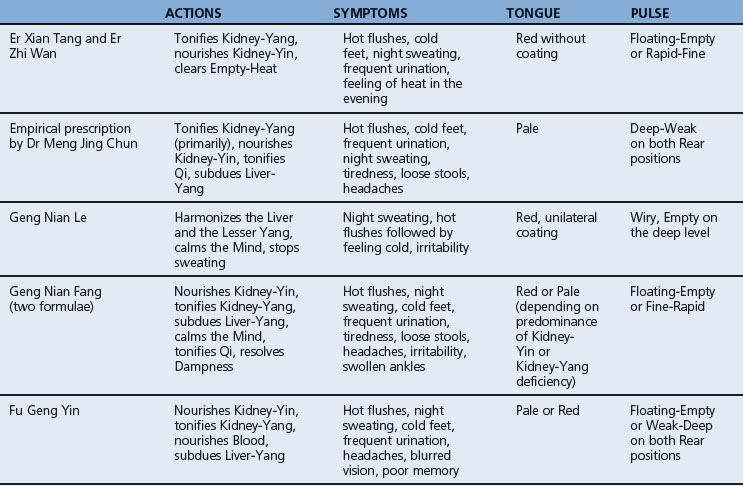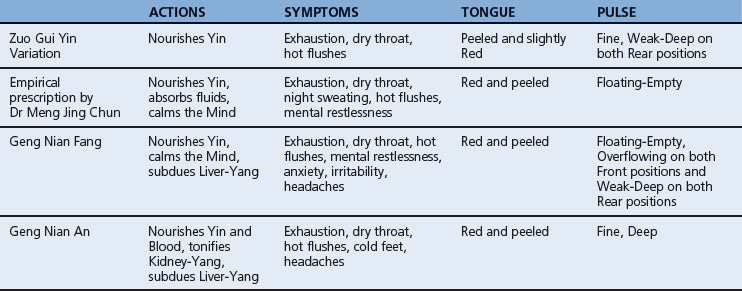Chapter 58 Menopausal Syndrome
Menopause usually occurs between the ages of 48 and 55 and the median age in industrialized countries is about 51. It will be remembered that the very first chapter of the Simple Questions describes the 7-year cycles of women, according to which menopause occurs at 49 (7 × 7): this is not far from the above-mentioned median age of 51. Furthermore, data analyses indicate that the menopausal age has remained unchanged for centuries.1 Indeed, the mean age at menopause is just over 50 and this is remarkably constant not only throughout the Western world but also in other countries. A survey of Malaysian women showed a mean age at menopause of 50.7 years, and another of seven Asian countries found that most women reached menopause at around 50.2
Aetiology
Pathology
However, the most common situation in the menopausal age is that there is a deficiency of both Kidney-Yin and Kidney-Yang albeit in differing proportions; if Kidney-Yang deficiency predominates, the tongue will be Pale. As mentioned in Chapter 3 on pathology, a combined deficiency of both Kidney-Yin and Kidney-Yang in women over 40 is very common: indeed, it is probably more the rule than the exception. With Kidney-Yin deficiency, it is easy to explain the hot flushes (flashes): when Yin is deficient, Empty-Heat develops. How to explain hot flushes in Kidney-Yang deficiency? This is due to the fact that when Kidney-Yang is deficient, Kidney-Yin is also deficient (albeit to a lower degree) and therefore some Empty-Heat also develops. Quite simply, in a menopausal woman, if the tongue is Pale, Kidney-Yang deficiency predominates: if the tongue lacks a coating (completely or partially), Kidney-Yin deficiency predominates (see Figures 3.2 and 3.3 in Chapter 3). For this reason, when using prepared remedies, one can often use two remedies simultaneously (each with a reduced dosage): the Yin-nourishing remedy can be given in the evening and the Yang-tonifying one in the morning, with the dosages of each reduced (compared with when a single remedy is used) and adjusted according to the predominant deficiency, e.g. a higher dose of the Yin-nourishing remedy if deficiency of Kidney-Yin predominates and vice versa if deficiency of Kidney-Yang predominates.
Identification of patterns and treatment
Kidney-Yin deficiency
Acupuncture
Herbal treatment
a Prescription
b Prescription
c Prescription
d. Prescription
Modifications
These modifications apply to all the above formulae.
Table 58.1 compares and contrasts the four above formulae for menopausal problems from Kidney-Yin deficiency.
Kidney-Yang deficiency
Treatment principle
Tonify and warm the Kidneys, tonify Yang, warm the Centre, strengthen the Spleen.
Acupuncture
Kidney-Yin and Kidney-Yang deficiency
Acupuncture
Herbal treatment
a Prescription
d Prescription
Formula I
e Prescription
Table 58.2 Comparison of formulae for menopausal problems from Kidney-Yin and Kidney-Yang deficiency

Women’s Treasure remedy
Diagnosis
Although she had few symptoms, the prevailing patterns are those of Kidney-Yang deficiency and some Liver-Blood deficiency. The menopausal symptoms of hot flushes and night sweating indicate Empty-Heat from Kidney deficiency, as do the backache and hair loss. Since the pulse is Weak on both Rear positions, the only factor that points to Kidney-Yang deficiency is the Pale colour of the tongue. As explained in Chapter 3 on pathology, in women over 50 a deficiency of the Kidneys nearly always involves a deficiency of both Yin and Yang, albeit always in differing proportions. Thus, when Kidney-Yang is primarily deficient, Kidney-Yin also becomes slightly deficient, giving rise to the Empty-Heat symptoms that cause the menopausal problems. Figures 3.1, 3.2 and 3.3 illustrate this clinical situation. In this patient, the brittle nails indicate some Liver-Blood deficiency.
A 53-year-old woman complained of menopausal problems for the previous 3 years, after her periods stopped. Her main problems were severe hot flushes, night sweating, depression, anxiety, mood swings, a tingling feeling all over and insomnia. She also complained of severely cold feet and frequent urination. Her tongue was Red with a slightly rootless, yellow and dry coating (Plate 10) and her pulse Rapid, Overflowing on both Front positions and Weak and Deep on both Rear positions. Although most of these symptoms started after her periods stopped, she had a history of severe stress in the years leading up to the menopause (husband’s redundancy, father’s death and daughter’s breakdown) and this obviously accounted for the severity of the menopausal symptoms. As explained in Chapter 4 on aetiology, the kind of menopause a woman experiences depends on her lifestyle in the years preceding it.




